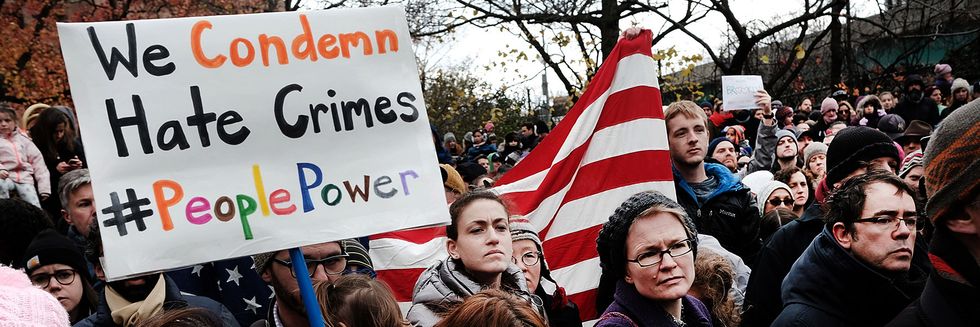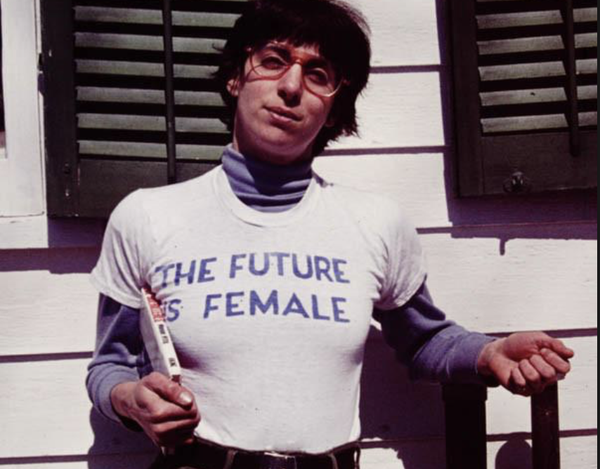I've finally had enough. With the recent attacks in Charlottesville (yes, ironic, I know), our president's muddled response to the white supremacist and nationalist groups involved, and my growing sense of unease and uncertainty about the nation's political and social climate, I feel that I have to take a stand for the values I believe in. Namely, that all people deserve to be treated like people, no matter what they look like, where they come from, or who they are. If I continue to say nothing, it will look like that I am somehow okay with all the hate and violence going on, which I most certainly am not.
This is a tough decision for me to make, as I am very introverted and social activism almost certainly requires social interaction, both positive and uplifting and negative and hurtful. As a first step, I have decided to start with a guide released by the Southern Poverty Law Center, a nonprofit organization dedicated to fighting hate and social injustice, detailing ten ways organizations, groups, and individuals can fight hate in its many forms wherever they are. The full guide is available here, with a free PDF version available to download and distribute if you so desire.
1. Do something.
Whenever a hate crime occurs or a hate group holds a rally, you have to act against it. Being silent, again, makes whatever has happened seem okay, to the victims' detriment and the perpetrators' benefit. Hate destroys the fabric of civil society wherever it occurs, and tends to escalate if not caught early. Anything counts: hold a community meeting, attend a vigil, use whatever skills you have. Like, for instance, writing.
2. Reach out to the community.
You are (probably) not alone in wanting to fight hatred. Go to your social pillars, your churches or teachers or local law enforcement. In the event of a hate crime, people from all these groups often come together to hold dialogues about race or gender, even standing up to the hate groups. Changing the world does not have to rest on anyone's shoulders alone. There are many groups like this on campus at Loyola already, which makes this part honestly easier than it often is.
3. Support the victims.
Any victim of a hate crime has been attacked for being whoever they are--their sexual orientation, their ethnicity or their race. If a crime happens recently, you should support the victim in whatever way you can, to show they are valued and that this act of hate is not okay. If you are a victim, don't be afraid to reach out to the people around you, even the press. Report every incident that happens, and know your legal rights.
4. Say something.
Get the message out in whatever way you can; use your social media platforms, print fliers and posters, write lengthy blog posts. If the news media learns about your group or your actions, don't be afraid to make a statement, or even critique when it stumbles. Whatever you do, don't debate members of hate groups on a talk show or a public forum--it makes them seem legitimate, and is hard to rebut properly.
5. Educate yourself.
Learn about local hate groups, what they believe, and what their agenda is. Most hate groups, whatever the type, often share these views:
- "They want to limit the rights of certain groups they view as inferior.
- They want to divide society along racial, ethnic, or religious lines.
- They demonize the groups they hate with false propaganda and often outlandish conspiracy theories.
- They try to silence any opposition. " (Ten Ways to Fight Hate)
While these groups often spread these beliefs, most hate crimes are committed by young males, such as Dylann Roof, the perpetrator of the Charleston shooting in 2015. In order to be called a "hate crime", an actual crime(arson, vandalism, murder, etc.) has to be performed, and it must be motivated by a bias or prejudice of some kind(race, ethnicity, sexual orientation, etc.). Both hate crimes and "bias incidents"(a premeditated, prejudiced action, but not necessarily illegal) have large impacts on the communities where they happen, spreading fear and insecurity even in groups beyond the targeted community.
6. Don't show up at hate rallies.
Sure, a march or rally dedicated to racist and violent ideologies in your hometown can be disgusting, even offensive to everything you believe. Do not go to them, even to protest. A common undercurrent in the "alt-right" is that they are the oppressed and persecuted group (although a vast majority of them are white straight men). Showing up validates this opinion, and forces the police to try to keep the two groups from hurting each other. Even then, as Charlottesville tragically shows, violence still happens. Instead, hold your own "peace rally" somewhere far away from the hate rally; it will draw both community and media attention away from the hate group, as well as giving people a chance to show their support for unity and love. Another thing I should start doing is going to the solidarity gatherings that often occur on campus. My college is a good college.
7. Get community leaders to make a stand.
Community leaders need to take an active role when it comes to fighting hate; they can heal the wounds caused by bias and hate, and help the community address the problems at the root of hatred and bigotry. Leaders should swiftly denounce the perpetrators of a hate crime after it happens, and certainly not retract their statement the next day. Forming relationships with community leaders before any hate crimes occur helps educate them on the effects of hate on their community. Once a hate crime happens, you should demand a quick, strong public statement on the matter, encouraging them to call out the problem and putting pressure on them when they don't. A lot of pressure.
8. Keep engaged with the community.
Hate usually doesn't come from outside a community; it often bubbles quietly under the surface. Reach out to people who aren't like you, or are often marginalized or feared. If a community can come together, it is much stronger in the face of hate. The first thing to do is to change how you act-- join an organization dedicated to bringing people together, instead of tearing them apart. This might be one of the hardest parts for me; I have a hard time participating in regular communities, let alone diverse ones. Again, small steps; online communities count.
9. Teach tolerance.
In the words of Oscar Hammerstein, you've got to be taught to hate and fear. Support movements to help spread tolerance and acceptance of those who are different in K-12 schools. Try to model inclusivity in your daily life, as much as you can.
10. Search your heart.
Everyone is prejudiced in some form; we absorb them from the culture, from what we watch, witness, read... It's hard to acknowledge when your own behavior is biased in some way. I know I have often said and believed things that have been prejudiced in the past. It's a personal challenge to identify in what areas I have biases, and try my best to change them, and ultimately move past them. It might be a long process, but ultimately it's what I have to do.
I hope this guide has been helpful. Again, the full guide is here, along with more information about hate groups and what you can do to stand against them.



















